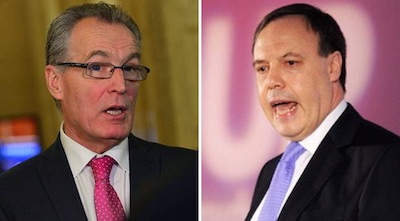
By Jim Gibney (for Irish News)
In 1981 the nationalist people of Fermanagh/South Tyrone voted tactically against Thatcher and made Bobby Sands - a man on hunger strike in a prison hospital - their MP. He would never be able to take his seat. But they voted for him in their thousands.
Out of this historic decision emerged the modern Sinn Fein party we know today.
In the subsequent by-election after Bobby’s death, tactical voting elected Owen Carron, Bobby’s election agent, with an increased majority.
Also in 1981 the people of Cavan/Monaghan and Louth tactically voted and elected Ciaran Doherty and Paddy Agnew to Dail Eireann upsetting the two-party system. There has never been a single-party government since. Tactical voting by nationalists elected Martin McGuinness in Mid-Ulster, Michelle Gildernew in Fermanagh/South Tyrone and Pat Doherty in West Tyrone.
Nationalists in South Belfast tactically voted and elected Alasdair McDonnell as their MP. Mark Durkan (Foyle) and Margaret Ritchie (South Down) are elected courtesy of unionists tactically voting for them to prevent Sinn Fein from winning both seats. And in 1992 loyalists tactically voted for Joe Hendron (SDLP) to ensure Gerry Adams lost West Belfast.
As we can see, tactical voting when used strategically can make a dramatic change. It can also positively contribute to progressive politics.
The option of tactical voting will play a crucial role in the present Westminster election where Sinn Fein tried to formalise an electoral pact with the SDLP but was rejected.
So, Sinn Fein has decided to appeal directly to SDLP supporters in a ‘people’s pact.
In return it pledges to defend the poor and marginalised and the rights of ethnic minorities, and to promote reconciliation, social justice and equality.
A ‘people’s pact’ can secure Fermanagh/South Tyrone for Michelle Gildernew and see Gerry Kelly win north Belfast, bringing to an end 130 years of unionist misrule.
Michelle Gildernew held her seat by four votes in 2010. There and in North Belfast, the slogan ‘every vote counts’ means just that. Nationalists are particularly aware of the resonance of Fermanagh/South Tyrone because of its link to Bobby Sands when the young Belfast man got more votes than Thatcher in her constituency of Finchley. Bobby’s election was an internationally recognised moral victory, which changed things utterly. But it also became the springboard for the meteoric rise of Sinn Fein. The task facing Gerry Kelly is huge but so is the prize - the unseating of Nigel Dodds of the DUP and the defeat of the Cameron-led Tory/ unionist pact.
For the first time since 1885 there is now a nationalist majority in north Belfast. It is a slender majority - 1,305 - but a majority nonetheless.
Gerry Kelly is a formidable, energetic leader, immersed in the grass roots of north Belfast. He has always been at the coalface as the expressions goes.
The demographic shift in North Belfast means that nationalists, perennial victims of sectarian supremacy, now have the opportunity to end unionist domination as they did in Mid-Ulster and West Tyrone. This is a powerful incentive for them to vote for Gerry Kelly.
Tactical voting undoubtedly presents difficulties for SDLP supporters who have been loyal to Alban Maginness for many years. But they have overcome their reservations before, and the figures tell the tale. Only Kelly can unseat Dodds.
Sinn Fein canvassers on the doors are appealing to them to ‘lend Gerry Kelly’ their vote for this election and return to the SDLP in subsequent elections. It is an appealing argument and has been successful in other constituencies. Nationalists will be highly motivated to use their newfound status as a majority to end unionist domination of the area.
Nigel Dodds is especially disliked for his confrontational style of politics; his involvement in controversial Orange Order marches; his insistence on marching past Ardoyne not just in the morning (over which nationalists have compromised) his attacks on the peace process and his support for the Tories and their savage welfare cuts.
North Belfast is the cockpit in this election because of the potential change it heralds.
A win for Gerry Kelly not only removes the unpopular Nigel Dodds but it is also a blow against David Cameron and his vicious attacks on the welfare state and public services.
![[Irish Republican News]](https://republican-news.org/graphics/title_gifs/rn.gif)
![[Irish Republican News]](https://republican-news.org/graphics/title_gifs/harp.gif)

